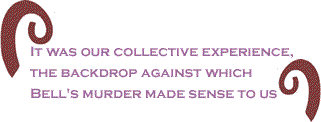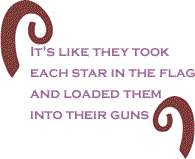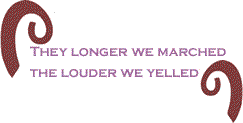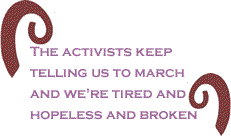
|
||||||||||||||||||||||
 |
||||||||||||||||||||||
 |
||||||||||||||||||||||
 |
||||||||||||||||||||||
 |
||||||||||||||||||||||
 |
||||||||||||||||||||||
 |
| The current issue is always free to everyone |
|
|
 |
| Today the value of my life dropped. It was on a scale held by Queens State Supreme Court Justice Arthur Cooperman. In one pan were three NYPD policemen and in the other the death of Sean Bell, a young black man they shot down last year. I had gone to the funeral, had seen his grey face quiet in the coffin and met his mother at the vigil outside the police precinct. It was real to me and to my friends. We stood in the pan with
“Did you hear the verdict,” she asked, less a question than an invitation. “Alena, it's like we're ghosts again,” I said. “I saw the picture of Nicole Bell, his fiancé-to-be, man she looked so broken. Fifty shots, Alena, fifty shots! It's like they took each star in the flag and loaded them into their guns.” We hung in that moment, quiet, waiting for the pulse of rage to pass before speaking. “I know, I know, it's like I just feel defeated, empty,” she said. “A lot of folks are just stunned right now.” Her voice got sharp, “Did you notice the price of oil goes up as the price of black life goes down?” The air flew out of me. We laughed. “Oh God Alena, no. Maybe they should put black people in the oil cans, shake us and pour us into their cars.” We cackled darkly. “It would solve the energy crisis,” I said. “They'll find a way to convert black people into fuel. We'd be good for something,” she laughed, tightening the joke like a tourniquet. This is how it's done, I thought, we see the hate coming and bite into it; to savor the momentary control over it, to chew it to bits with laughter. “Okay,” I said, “We can't make racist self-hate jokes too long even if it's for a good cause.” She asked if I was going to the rally. I said yeah, we promised to meet later. The moment after a conversation, a good one, has an after-glow. Real words have an inner-light that allows every layer of meaning, every sediment of tone a brief visibility to the mind. Even as it recedes, it leaves a hope that we don't have to stumble blindly in our feelings. I ran down the stairs, into the street ready to join my neighbors on the corner, ready to stoke our words into a fire but no one was out. The few who were, pushed laundry carts across the street or sipped at steaming coffee cups while waiting for work. Kids bounced basketballs on the sidewalk. I was dazed by the absence of my imagined scene, the gravity of expectation was cut and I floated inside myself. Where we at? As I walked to the subway, the two Rasta-men
next door hailed me. I waved back, told them about the verdict.
“They jus' getta way wid murder,” one shook his head, “is wrong
man but...” He didn't shrug but stood silent, as if trying to
find an answer but looked up blankly. I asked if he had a computer.
We're missing something I felt. The vibe was
close to joyful vengeance. It contrasted the despair I saw in
photos from the verdict this morning. What I remember from Sean
Bell's funeral, from his mom Valerie Bell at the precinct was
pain, a deep pain welling up from the absence of a man they
loved. For us, It's as if working people suffer from near-sightedness. The survival of daily life, the drama of family, of love, of loss, of money owed and favors given take up the whole horizon. They can't see the larger system that is their invisible cage. Revolutionaries unknowingly suffer from far-sightedness. They see through the prism of history, so that only that cage is visible. Ideas and archetypes are for us, more real. Each new victim, like Sean Bell, is reduced to a sign of another domino falling under the momentum of power. Such historical far-sightedness can cause blinding arrogance. “When we chant 'No Justice, No Peace' what does
that mean,” she demanded. I didn't know anymore. It didn't mean
civil disobedience as people shifted uneasily, moving their
signs from one shoulder to the other. The brother next to me
noticed my distraction, he introduced himself. “I'm Robert,”
he showed me his leaflet. The metaphorical image I instantly
had of him was of a pillar circled by clouds. He had this inner
center of gravity surrounded by a deep calm. “Robert,” I asked,
“Who is everyone here?” He pointed out Worker's World, the splinter
groups ANSWER and Party for Socialism for Liberation. He spoke
with a lyrical Ghanaian accent, listening to him was like drinking
Guinness. “Over there is the Spartacus League. Their like relics,
any conversation circles back around to the I eyed him, “Why do you seem so calm.” He smiled wistfully, “I know we're just a propagandist group,” he held his palms up as if showing he was innocent of expectation. “I know revolution won't happen soon,” he paused. “We spread ideas. That's what we do.” I pointed to the brothers with Pan-African colors. “They're an international Pan-African organization,” he said, “They call for immediate revolution.” The calculations ran through my head, “What's that, Pan-African Stalinists?” He smirked, “I didn't say that.” I nodded, “I know.
“Fuck you pig!” I turned to see who shouted it. An Asian college kid had a goofy grin. “Yeah fuck you,” he yelled again at the cops. Inside the march was a maelstrom of rage. When I ran ahead of it, past the police stiffly looking ahead as we baited them, past the blinking cruisers to the far front where the march looked more like a parade. It had an air of festival rage.
Looked ahead to the far road, I thought we aren't going anywhere but in circles. No one is listening to us but us. We demand a revolution in fiery rhetoric but won't even do an act of simple civil disobedience. We can't even say aloud the obvious truth that Mayor Bloomberg and Police Commissioner Ray Kelly knew we'd march and let us, doing the math and figuring correctly that we weren't worth arresting. We turned into the lot of the Kalua Nightclub,
where The splinter march thundered along the main avenue.
Inside the overpass of the Walking to the subway, I looked at the streets we just passed through. People were shopping again, cops gabbing on the corner. In the wake of our chanting and marching it had closed up again. Maybe this was the secret of power, not just violent oppression but also indifference? In the train back to Nostrand, I studied the riders. Blonde girls straightened their skirts. Latino families ushered kids in and out. Mexican men in work clothes, eyes shut listening to I-Pods. So many circles orbit each other in this city I thought but can they ever fuse into a halo for a young black man, killed by cops last year and see in him the vulnerability to state power we all share?
I've been in marches from the February 2003 anti-war tidal wave to smaller ones and yes, going on without a permit is a necessary step but without the ability to shut the city down it becomes a conservative gesture. We release our rage in the street like boiling water cooling in the open and then flow back to the nooks and crannies of our private lives.
Without a movement to push Sean Bell's unlived life into our collective consciousness, without civil disobedience on a mass scale he will die a second death. His fiancé Nicole Paultre-Bell said after the verdict, “They killed Sean all over again.” And she's right. His memory is our responsibility. If he disappears, it's our fault, its' our indifference that caused it. The NYPD killed Sean Bell but it is we who are letting him die. Nicholas Powers is an Assistant Professor at SUNY Old Westbury. Click here to contact Mr. Powers. |
Your comments are always welcome. e-Mail
re-print notice
If you send us an e-Mail message we may publish all or part of it, unless you tell us it is not for publication. You may also request that we withhold your name. Thank you very much for your readership. |
|
| May
1, 2008 Issue 275 |
|
| Executive Editor: Bill Fletcher, Jr. |
| Publisher: Peter Gamble |
| Est. April 5, 2002 |
| Printer Friendly Version in resizeable plain text format format |
 |
 |
 |
| |
| |






















 I
woke early, blinking half-blinded by dreams and daylight, stumbled
to the computer, eager for the verdict but scared and hopeful.
“Maybe,” I mumbled, “Maybe.” The screen lit and I typed
I
woke early, blinking half-blinded by dreams and daylight, stumbled
to the computer, eager for the verdict but scared and hopeful.
“Maybe,” I mumbled, “Maybe.” The screen lit and I typed  The
train ride from Nostrand to
The
train ride from Nostrand to 


 The
whole weekend, I read about passionate speeches and small marches.
One hundred or so protestors marched in
The
whole weekend, I read about passionate speeches and small marches.
One hundred or so protestors marched in 







